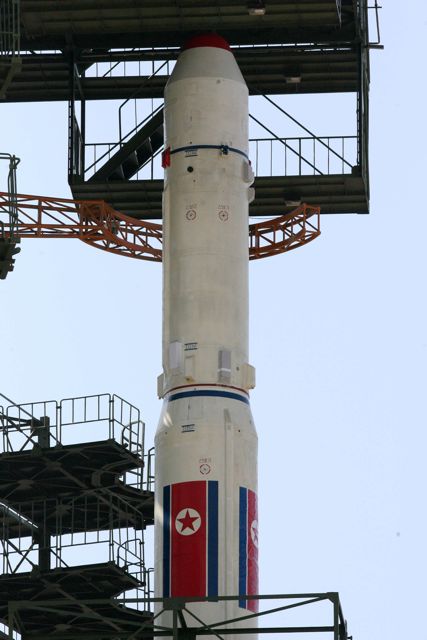 By Tom Lasseter, McClatchy Newspapers –
By Tom Lasseter, McClatchy Newspapers –
BEIJING — After the embarrassment of a much-publicized rocket launch ending in explosion, North Korea offered a new puzzle Friday for international observers: What will the isolated country do next?
(PHOTO: The Unha-3 rocket for launching Kwangmyongsong-3 satellite installed on the launch pad at Tongchang-ri base, the Democratic People’s Republic of Korea (DPRK) is seen in this April 8, 2012 photo. Media reports said theDemocratic People’s Republic of Korea launched an earth observation satellite on April 13, 2012, where it broke up quickly and splashed into the Yellow Sea.)
The Unha-3 (Galaxy) rocket and the satellite it carried were meant to be a grand reminder of the 100th anniversary of the April 15 birth of Kim Il Sung, the nation’s founder. It was also a public assertion of the standing of his grandson and North Korea’s current ruler, Kim Jong Un.
That the launch ended so disastrously — the rocket burst into pieces two minutes or less after takeoff at 7:39 a.m., according to the South Korean Defense Ministry — raises the question of whether North Korea will now up the stakes.
Beyond the usual erratic behavior and secrecy of the North, there are concerns about the stability of a regime led by Kim Jong Un, a man thought to be in his late 20s who was thrust into the position after the death of his father, Kim Jong Il, in December.
The government had invited a contingent of Western TV and wire service journalists to report the achievement, making it that much more of a humiliation to have to acknowledge, via an official news service, that “the earth observation satellite failed to enter its preset orbit.”
Pentagon spokesman George Little said U.S. analysts believe the rocket failed after its second stage had ignited. He said the U.S. played no role in the explosion, noting that previous North Korean missile launches also had fallen short of their announced goals.
“Their recent track record is not good,” he said.
North Korea claimed that the rocket was a peaceful endeavor meant only to launch a satellite. But it was widely seen as a test of intercontinental ballistic missile development, which would violate a United Nations ban on the North’s use of such technology.
U.S. officials had warned against the launch, and Little said the explosion didn’t change that view. “Even though it failed, (the launch) was a violation of international law,” he said.
Little urged North Korea not to follow up with another “highly provocative act.”
That suggested worry about North Korea’s other contentious program, nuclear weapons.
A South Korean intelligence report widely quoted earlier this week said that the North appeared to be readying for its third nuclear test. Satellite images of an area where tests were conducted in 2006 and 2009 showed a new tunnel being dug, according to The Associated Press.
Not everyone is convinced, though, that Pyongyang will push ahead anytime soon with a nuclear test or further provocations.
While there is sure to be frustration about the rocket’s failure, the act of the launch itself might have been sufficient to demonstrate the “strong willingness” of Kim Jong Un, said Su Hao, a scholar at the China Foreign Affairs University in Beijing, which is affiliated with China’s Foreign Affairs Ministry.
Asked what he meant by “willingness,” Su replied: “To do whatever he wants to do, including violating the wishes of the international community.”









